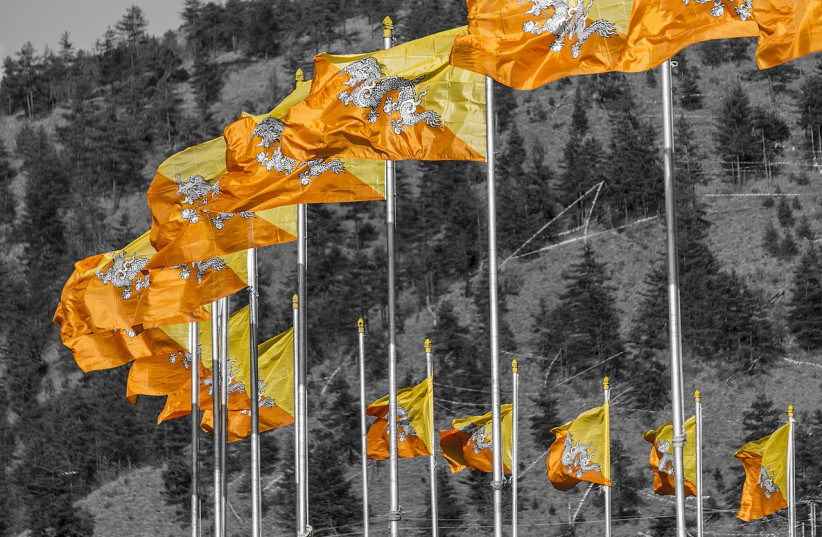December 12 marks a year since Israel established full diplomatic ties with the Kingdom of Bhutan.
The formation of these ties came following the signing of the Abraham Accords, wish established normalized relations between Israel, the UAE, Bahrain and Morocco.
However, the Bhutan ties were in no way connected. In fact, while the Abraham Accords were largely mediated by then US president Donald Trump, the US and Bhutan lack any official relations whatsoever.
Rather, ties between the Jewish state and the Buddhist kingdom in the Himalayas were the result of many rounds of secret talks.
The kingdom itself is an isolated nation bordering India and Tibet and has a unique culture and ecosystem. Tourism to the country is very limited, especially from outside the immediate region. The country has been a constitutional monarchy since 2008, before which it was an absolute monarchy. The position of monarch still exists, however, whose official title is Dragon King. The country was the first to fully ban tobacco (though this was partially reversed in 2021), it has no traffic lights and the country's most popular sport is archery.

Including Israel, only 54 countries have relations with Bhutan, with world powers like the US, UK, France, Russia and China not being among them. And even among those allies, Bhutan only has seven actual embassies.
Bhutan is also the only nation in the world to not recognize either China or Taiwan.
But the isolated kingdom had reached out to Israel in recent years, according to then-Israeli ambassador to India Ron Malka, following Israeli support of Bhutanese agricultural development since 1982.
They have been impressed by Israel’s abilities for many years, and their prime minister wanted relations,” he said in 2020. “We advise them on topics that are important to them like water management, agriculture and technology... education and professional training as well. They’re very interested in the topic of medicine.”
Bhutan’s government “thinks of Israel as a leading country in technology and innovation that can help them progress and use more advanced technology and train their youth.”
Bhutan, which is about twice as large as Israel but only has 800,000 residents, is thought to be one of the most beautiful countries in the world, allowing television and the Internet only in 1999.
It uniquely measures its quality of life by “Gross National Happiness” instead of gross domestic product (GDP) – in fact, the World Happiness Report was a joint initiative of the Bhutanese prime minister and the UN secretary-general in 2011.
That metric emphasizes sustainable development, environmental conservation, preservation of culture and good governance, as well as mental and physical health, among other values.
The Bhutanese are thought to be among the happiest people in the world, and the happiest in Asia, but they are also among the world’s poorest.
Further, according to the Guardian, the "Land of the Thunder Dragon" has problems with corruption and gangs.
However, the nation is famous for its comparatively pristine environment. The kingdom is known for having reserves of many different valuable minerals and natural resources that could be exploited with mining. But do to a desire to conserve its environment, there hasn't been any mining of these minerals.
This desire to protect its environment is also part of its strict tourism policies, as rampant tourism can cause significant damage to the environment.
As the kingdom still wants to be a tourist destination, it employes a policy known as "high value, low impact." This planned sustainable tourism policy sees a focus on making sure only the wealthy actually go to Bhutan. In fact, tourism to Bhutan is notably expensive, with tourists having to pay a hefty daily fee to stay there.
Will Bhutan open its doors to more Israeli travelers, however? That remains to be seen, but it was something discussed in 2020 when relations were established.
“They let very few people visit, even though it is very attractive, because they want to preserve its history and its nature and environment,” Malka said at the time. “It was very hard before, but now Israelis will be more accepted – and they will want to develop [Israeli] tourism.”
Lahav Harkov contributed to this report.
